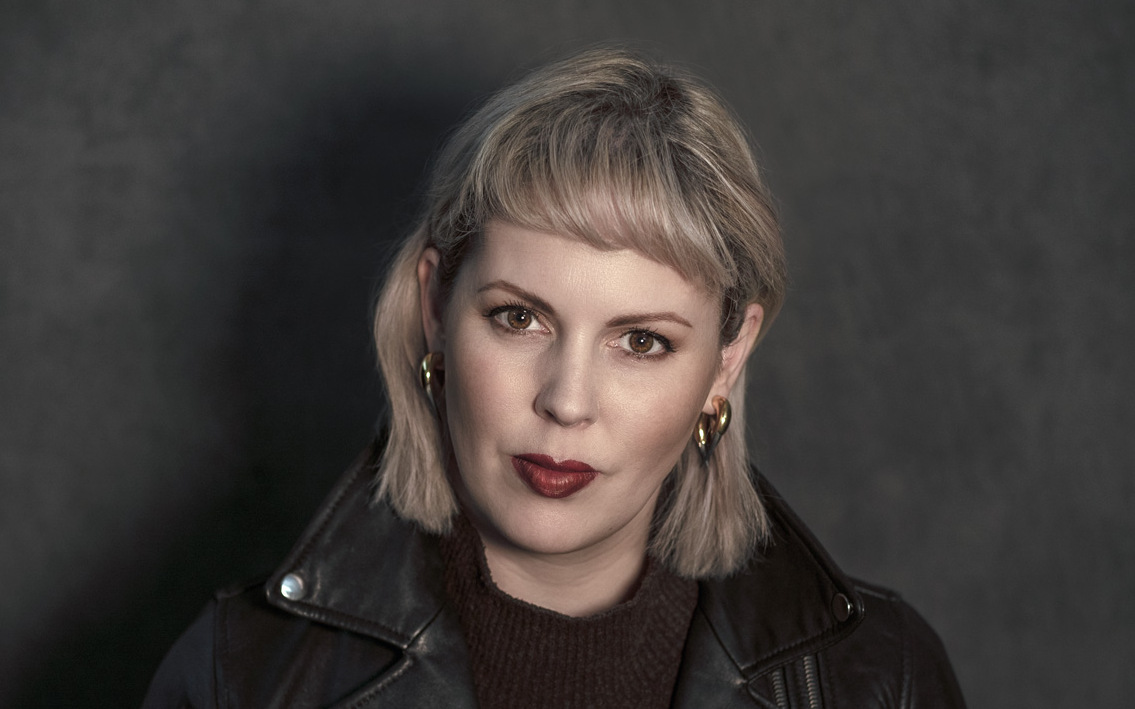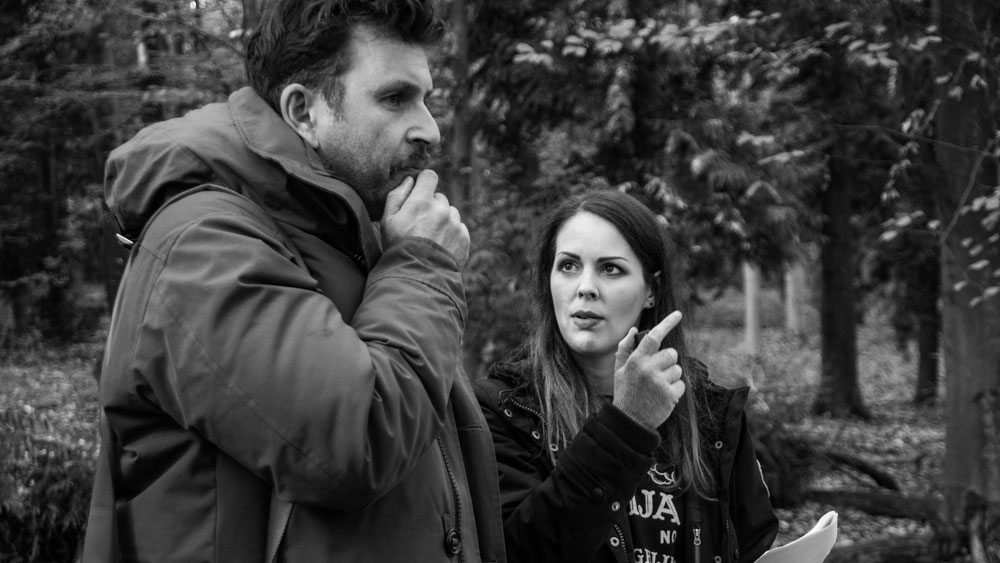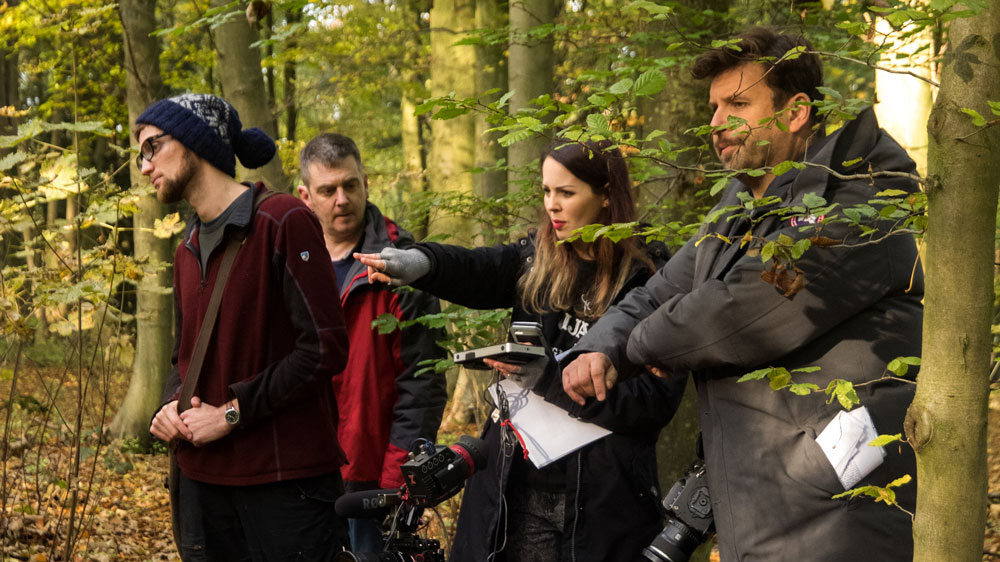
Emma Dark is an award-winning filmmaker and actress. Deeply passionate about “film” she began her narrative filmmaking career in 2014, debuting at festivals with horror/action short Seize the Night (2015), featuring Anthony Ilott (Wrong Turn 6: Last Resort), with fight choreography by Roy Scammell (Alien, A Clockwork Orange).
Emma Dark ‘s second festival short, sci-fi/horror Salient Minus Ten (2017), received its premiere at Cineworld Leicester Square as part of the British Horror Film Festival and stars Star Wars: Episode V – The Empire Strikes Back actor Alan Austen in the lead role, with cinematography from internationally renowned DoP Philip Bloom.
Accolades include winning Starburst Magazine’s MediaCity Film Festival 2018 Best Director award, the YFIFF 2018 Albert Pyun Inspiration Award, the YFIFF 2015 Rising Star award, the Stormy Weather 2017 Outstanding Female Filmmaker award, and the Stormy Weather 2019 Best Editing award.
indieactivity: How do you choose a project to direct?
Emma Dark (ED): To date, I’ve only directed ‘my own’ narrative projects, so it’s less a case of choosing and more a case of being driven by what interests me at the time. The subject and style will always be driven by something influential in my life, generally. As a massive horror and sci-fi fan, I lean in that direction with my filmmaking. On the odd occasion, I’ve been approached about directing a narrative project I’ve looked at the experience levels of all involved and the story at hand. If the project is set to be finished to a high production value and the story is engaging and within the realms of my personal interests, it would certainly be appealing.
The Official Trailer for Salient Minus Ten directed by Emma Dark and shot by Philip Bloom
Why filmmaking and screenwriting? Why did you get into it?
Emma Dark (ED): I’m a very creative person, and prior to narrative directing and filmmaking have been involved in many different artistic pursuits including photography, creative design, acting and modelling, and corporate video and web advertising. Narrative filmmaking for me allows a dream to become a reality. For the filmmaker at least, it’s a physical process, a way of building the stories that sit within your imagination into something tangible, and hopefully, all being well other people get to see them the way you do.
How can a filmmaker, if she so chooses, distribute her film? How do you get it in front of an audience?
ED: This is a difficult question, certainly for short film. There’s the obvious route with taking your film around the festival circuit and allowing an audience to see it that way. This often has various levels of success, and can cost a lot of money in submissions and attending events. If you are lucky you will be selected at some brilliant film festivals and garner lots of laurels and awards. This doesn’t happen for everyone, although I do believe there is a festival for every film. You can of course post your work directly to web, again this has varying levels of success. I don’t know what the formula is for garnering lots of web views, it can be very sporadic. You can of course try to distribute a short on more established channels on YouTube and beyond.
I also produce a small DVD run of my films. If you are distributing your DVDs or Blu-rays in the UK you will need to BBFC rate them, and that does come at a cost. I wouldn’t expect to make money back off of a short film DVD run, breaking even is generally about the best you can expect unless your film is incredibly popular.
Is there anything about the making of independent film business you still struggle with?
ED: Yes definitely. The main issue I have is raising enough budget to cover all production costs (I have not managed to do this to date, and it’s an expensive business). Secondly, distribution for short films is a struggle. As I mentioned above it’s not easy. And while you are busy trying to get your film and the fantastic work of your cast and crew seen you will face many challenges, including piracy sites who wish to profiter off of your (probably free to view) work, and of course detractors who will never like or endorse your work no matter how good it is. The latter is an unfortunate aspect of many creative persuits, and I’d advise any filmmaker reading to concentrate on the people and organisations that do back and like your work.

Talk to us about your concept of collaboration?
ED: It’s necessary for most films in my opinion. I know there are filmmakers that can successfully make a great film entirely by themselves, but most of the time you need some cast and crew on a narrative project. In which case it’s important to work with or hire people you will get on with and who are genuinely interested in your project. If you’re working with low or no budget you must ensure your cast and crew get the credit and respect they deserve for collaborating with you. I’ve seen many a film fall apart when those collaborating with a creator are taken for granted.
What uniqueness do female directors/filmmakers bring to Film/TV/Cinema?
ED: I’d be interested to know if anyone watching my films without prior knowledge of the credits would assume they are made by a female or not. I don’t think I tell overtly feminist stories, and I think sometimes people expect that – in my opinion, I have to some extent, been taken less seriously in this arena because I do not. Personally, my view is that women are under-represented in the film industry as directors and filmmakers and often this is because others wish to box us into other roles (for example acting, production design, makeup), and in my experience, we don’t get the same directorial and funding offers as men do.
When you are offered a project, what things do you put in place to deliver a good job?
ED: To me, key elements are actors, cinematography, score, sound, and a rock-solid crew. It’s often crew members that sit outside of the traditional credit block (for example Wendy Rose who has worked as a set production assistant on both of my festival films) that go unsung, but really is as important as the traditional key cast and crew. Personally, I would like to see more women in film who work in behind the scenes roles like these highlighted and praised.
How do you find the process of filmmaking as an indie filmmaker?
ED: There are exciting parts, there are tedious parts. Theres a whole lot of time, money, energy, passion, creativity, elation and frustration mixed together on a big rollercoaster of a journey that may run over several years. Dealing with and meeting expectations (including your own), receiving praise, receiving criticism, these are all parts of the filmmaking process that other people may not see.

Why would you choose an actor, writer or producer? What do you look for?
ED: In terms of any of these people I would need to know we were on the same wavelength and I could work well with them to achieve the same end goal. For an actor they must be able to take direction. For a writer they would need to understand my concept or write something that would peak my interest. For an exec producer, they would need to be able to bring a budget to the table and have faith in me to use that money wisely.
At what period in the filmmaking process, do you need to start planning for distribution?
ED: You should always plan one step ahead. Some are lucky enough to have a distribution mechanism on offer early on, but I generally start planning my festival submissions towards the end of post-production, and my final distribution during the festival run.
Indie filmmaking is a model of zero or small budget. How do you get a film to the audience with such a budget?
ED: If you have absolutely no budget you can submit to festivals that take no entry fee, there are many of these, just check them out thoroughly beforehand. Again, you can always post straight to the web too.
How do you think filmmakers can finance their projects?
ED: I’ve used crowdfunding to varying degrees of success, so that’s always an option. Some people are lucky enough to find a private funder who may donate a sum of money for a credit or place on the cast and crew. There are also funding bodies, I’ve had no success with those personally.
Describe your most recent work, or film, take us through pre-production and post-production?
ED: At the time of writing I have recently released my retro sci-fi- horror short film Salient Minus Ten.
Synopsis: Adam Harper (Alan Austen, Star Wars: Episode V – The Empire Strikes Back) is an average man. And on an average day, he suddenly finds himself catapulted into the strangest, reality changing game… A game of time and chance, where the stakes are a matter of life and death.
Edited, Produced, Written, and Directed by Emma Dark
Original Music by Eric Elick
Director of Photography Philip Bloom
Sound Design by Chris Collier
Adam Harper – Alan Austen
The Woman – Emma Dark
Commuter/Automaton – Chris Hampshire
Commuter – Beric Read
Commuter – Samantha Oci

What is your experience working on the story, the screenplay, the production, premiere and the marketing?
ED: I’ve been involved in many aspects of the filmmaking process, in all of my films. With “Salient Minus Ten” it was production, writing, direction, editing, colour grading, graphics, marketing and PR, and even some acting! The film received a fantastic premiere at Cineworld Leicester Square, London as part of the British Horror Film Festival. I don’t think it gets glitzier than that, and it was the start of a good festival run for the film. I always market my own films, including writing and sending press releases – something which I’ve also done for a number of other indie films as well as it’s often one of the aspects many filmmakers struggle with.
How did you put the crew and cast together? Did you start writing with a known cast? What was your rehearsal process and period?
ED: I’d worked with all of the cast before in some capacity except for my star Alan Austen. I held a casting session in soho, London which Alan attended alongside some other candidates. Ultimately I cast Alan in the role of ‘Adam Harper’. We had a couple of rehearsals in London before shooting, and of course run throughs on the day.
What and how long did it take to complete the script?
ED: I wrote the script myself and it took about a month to write, more or less.
tDid the tight shooting schedule make it harder or easier? How did it affect performances?
ED: A tight shooting schedule always makes things harder, and of course is again often driven by budget. I think the acting performances were great, it wasn’t so tight I could only afford time for one take (which often happens on indie productions).
How much did you go over budget? If you did, how did you manage it?
ED: By quite a bit! The remainder of the budget came out of my personal savings, which isn’t a feasible option for every film going forwards. I think the rule of thumb should always be to budget a little higher than you think to account for unexpected costs.
What other films have you written and made?
The Isolation Horrors (Segment “Goryo”) (2020)
Purgatoric (2018)
Salient Minus Ten (2017)
Seize the Night (2015)
Island of the Blind Dead (2015)
What do you hope audiences will get from the presentation of your film?
ED: I would like the audience to make their own mind up about the story and what it means to them. I know what it means to me as the filmmaker, but I have intentionally made it abstract.

What are your future goals?
ED: To make more short films that are as well presented as successful and “Salient Minus Ten”, and at some point to make a feature (budget and time allowing).
Tell us about what you think indie filmmaker need in today’s world of filmmaking
ED: A fresh idea, or at least an idea well executed and the tenacity and passion to go the whole hog and bring that to life as part of a process which could take months or years.
What else have you got in the works?
ED: I’ve also just completed a Japanese horror inspired short film called “Goryō”, which you can watch online as part of “The Isolation Horrors” short film anthology.
Tell us what you think of the interview with “Emma Dark” What do you think of it? What ideas did you get? Do you have any suggestions? Or did it help you? Lets have your comments below and/or on Facebook or Instagram! Or join me on Twitter @oladapobamidele
Follow Emma Dark on Social Media
Website
IMDb
Facebook
Twitter
Instagram
Richard Green Documentary, ‘I Know Catherine, The Log Lady’: Premiere in NYC, LA May 9th
Lynchian Doc I Know Catherine, The Log Lady Makes Hollywood Premiere 4/17, Rollout to Follow
In Camera by Naqqash Khlalid Launch on VOD April 29
Naqqash Khlalid’s Directs Nabhan Rizwan. In Camera stars an EE BAFTA Rising Star Award Nominee.
2025 Philip K. Dick Sci-Fi Film Festival Award Winners Announced
Vanessa Ly’s Memories of the Future Awarded Best PKD Feature
Dreaming of You by Jack McCafferty Debuts VOD & DVD for April Release
Freestyle Acquires “Dreaming of You” for April 15th Release
Hello Stranger by Paul Raschid set for London Games Festival & BIFFF
The film Is set for an April 10th Premiere at The Genesis Cinema in London (LGF) and BIFFF
Daydreamers Official Trailer by Timothy Linh Bui: Released by Dark Star Pictures
Daydreamers Vietnamese Vampire Thriller – May 2nd release









